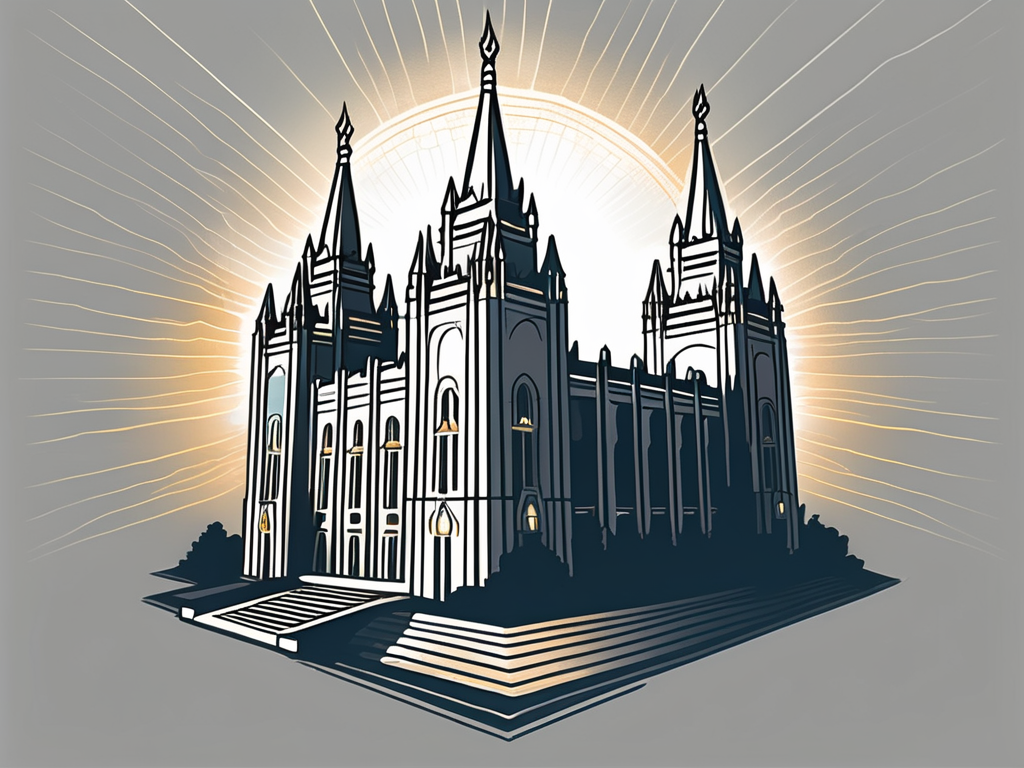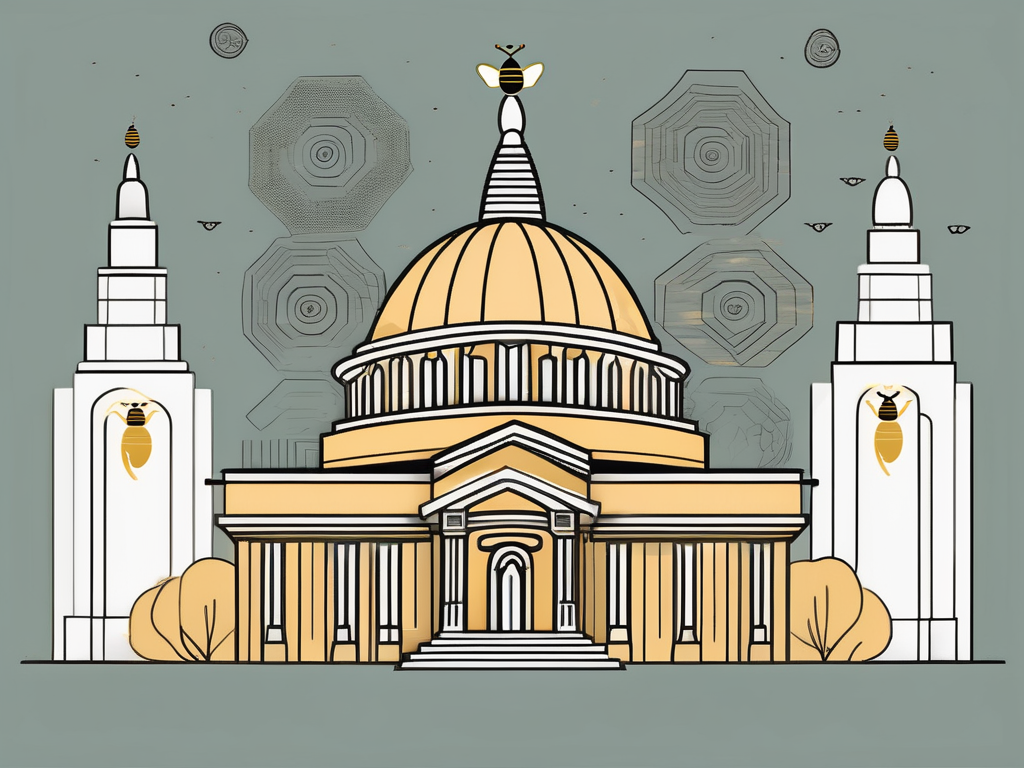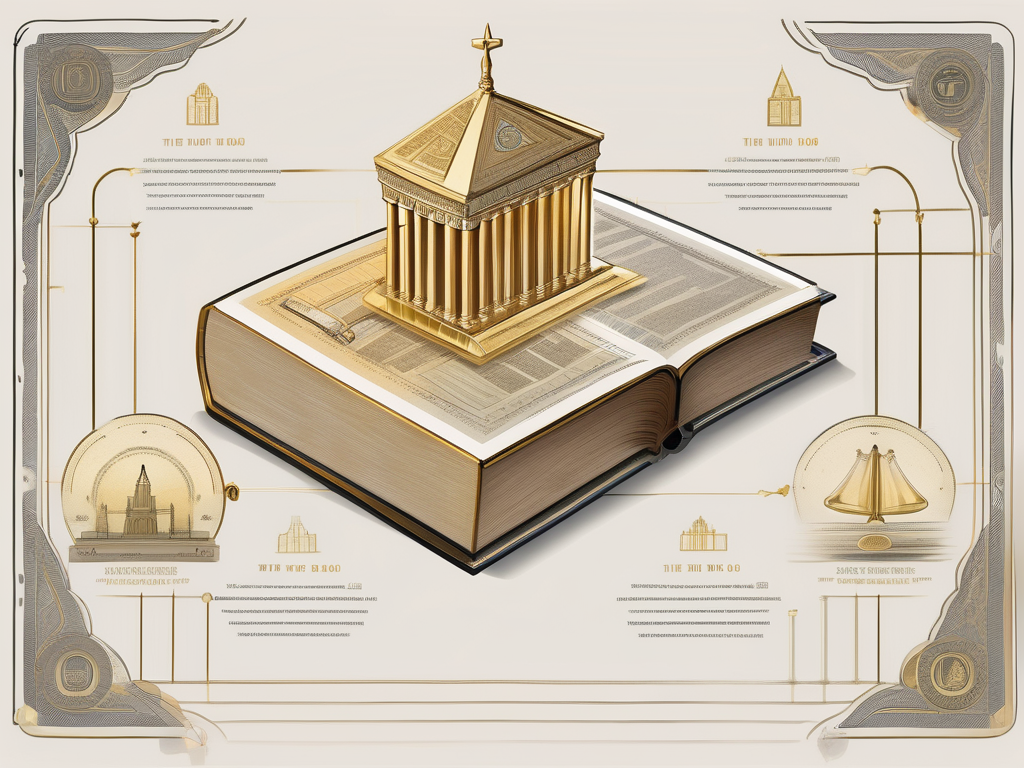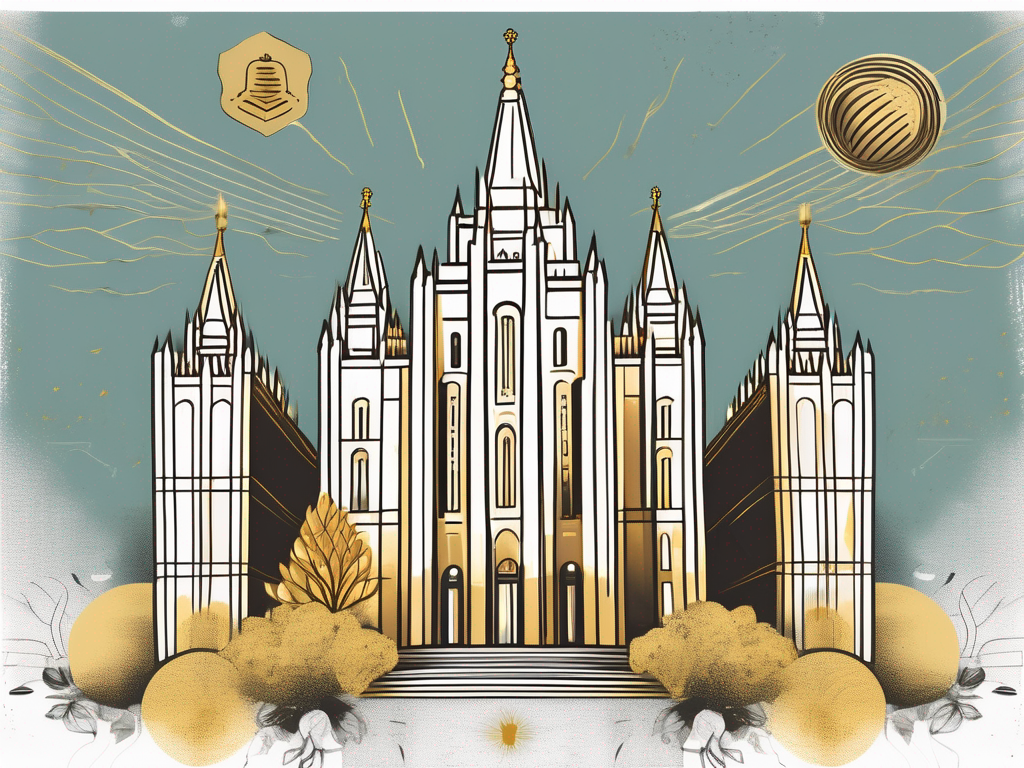Mormonism, also known as The Church of Jesus Christ of Latter-day Saints (LDS), is a unique religious movement that emerged during the early 19th century in the United States. This article aims to provide a comprehensive understanding of Mormon beliefs about God, exploring their origin, history, concepts, and doctrines.
The Origin and History of Mormon Beliefs
At the heart of Mormon beliefs is the founding of the Mormon Church by Joseph Smith in 1830. Smith claimed to have been visited by God the Father and Jesus Christ, who revealed to him a new Gospel and religious authority. This event, known as the First Vision, marked the beginning of Smith’s prophetic mission and the establishment of Mormon beliefs.
But what led Joseph Smith to this momentous encounter? Smith grew up in a religiously diverse environment in upstate New York, where various Christian denominations vied for followers. This religious fervor and the questions it raised about the nature of God and salvation deeply impacted Smith’s spiritual journey.
As a young man, Smith sought answers to his theological inquiries through prayer and study. It was during one of these earnest moments of seeking divine guidance that he experienced the First Vision. This extraordinary encounter with the divine not only shaped Smith’s personal beliefs but also laid the foundation for the formation of the Mormon Church.
Over time, Mormon theology has undergone development, with beliefs evolving and expanding. The early Mormon Church faced persecution and migration, eventually settling in Salt Lake City, Utah in 1847. This shift marked a significant turning point, as the Church grew and solidified its distinctive doctrines and practices.
Upon their arrival in Salt Lake City, the Mormons faced numerous challenges. They had to establish a community in a harsh and unforgiving desert environment, where resources were scarce. Through their unwavering faith and determination, the Mormons transformed the arid landscape into a thriving settlement, building impressive infrastructure and cultivating the land.
As the Mormon Church grew, so did its influence on various aspects of society. The Church played a pivotal role in the development of education, establishing schools and universities to provide a well-rounded education for its members. Additionally, the Mormons were known for their strong emphasis on family values, promoting the importance of marriage and raising children in a loving and nurturing environment.
Furthermore, the Mormon Church has a unique organizational structure, with a hierarchical system of priesthood authority. This structure ensures that leadership and decision-making are carried out in a unified and orderly manner. The Church’s leaders, known as apostles and prophets, are believed to receive direct revelation from God, guiding the Church and its members.
Throughout its history, the Mormon Church has faced both praise and criticism. Some admire its emphasis on family, community, and service, while others question certain doctrinal beliefs and practices. Nevertheless, the Mormon Church continues to grow and thrive, with millions of members worldwide.
In conclusion, the origin and history of Mormon beliefs are deeply rooted in the experiences of Joseph Smith and the early Mormon pioneers. From the First Vision to the establishment of a thriving community in Salt Lake City, the Mormon Church has evolved and expanded, shaping the lives of its members and leaving a lasting impact on society.
The Mormon Concept of God
Central to Mormon beliefs is the nature of God. According to Mormon theology, God is considered an exalted being with a physical body of flesh and bone. This belief differs from traditional Christian understandings of God as an incorporeal spirit.
Expanding on the nature of God in Mormonism, it is important to note that Mormons see God as a personal, loving, and involved Heavenly Father. They believe that He listens to prayers and interacts with His children on Earth. This understanding of God as a relational being emphasizes the close connection between humans and their divine Creator. Mormons find comfort in knowing that they can approach God with their concerns, seek guidance, and receive answers through prayer.
Furthermore, Mormons believe that humans are literal offspring of God. This belief stems from the understanding that all humans have the potential to become like Him in the afterlife through a process called eternal progression. This concept of eternal progression is central to Mormon teachings and emphasizes the idea that humans have the capacity to grow and develop spiritually, eventually reaching a state of exaltation and godhood.
The Godhead in Mormon Belief
In addition to God the Father, Mormons believe in Jesus Christ and the Holy Ghost, collectively known as the Godhead. While traditional Christian beliefs often describe the Holy Trinity as three persons in one God, Mormons view the Godhead as separate entities, each with distinct roles in the plan of salvation.
Jesus Christ, according to Mormon belief, is the literal Son of God and plays a crucial role in the redemption and salvation of humanity. Mormons believe that through His Atonement, Jesus Christ made it possible for individuals to repent, be forgiven of their sins, and ultimately return to live with God.
The Holy Ghost, on the other hand, is seen as a divine influence that can guide and inspire individuals. Mormons believe that the Holy Ghost testifies of truth, comforts, and helps individuals discern right from wrong. This divine influence is often described as a still, small voice or a feeling of peace and clarity.
By understanding the nature of the Godhead, Mormons are able to develop a deeper appreciation for the roles that each member plays in their spiritual journey. They seek to align their lives with the teachings and example of Jesus Christ, while also relying on the guidance and inspiration of the Holy Ghost.
In conclusion, the Mormon concept of God encompasses a belief in an exalted being with a physical body, a personal and loving Heavenly Father, and the understanding that humans can become like Him through eternal progression. Additionally, the Godhead, consisting of God the Father, Jesus Christ, and the Holy Ghost, plays a central role in Mormon belief, with each member having distinct roles in the plan of salvation. This expanded understanding of the Mormon concept of God provides a deeper insight into the rich theological beliefs and practices of the Mormon faith.
Distinctive Mormon Doctrines About God
Alongside their unique beliefs about God’s nature, Mormons also have distinctive doctrines that shape their understanding of Him.
Mormonism, also known as The Church of Jesus Christ of Latter-day Saints, is a religious movement that emerged in the early 19th century in the United States. The teachings and doctrines of Mormonism are based on the Book of Mormon, which Mormons believe to be an additional scripture alongside the Bible.
The Doctrine of Eternal Progression
Central to Mormon doctrine is the belief in eternal progression, which holds that humans have the potential to become gods. This concept sets Mormons apart from many other Christian denominations, who believe that humans can only aspire to be in the presence of God but not become gods themselves.
According to Mormon teachings, life is seen as a journey of personal growth and development. Mormons strive to become like God in knowledge, power, and righteousness. They believe that through obedience to God’s commandments, they can progress spiritually and eventually attain godhood.
This doctrine of eternal progression also extends to the afterlife. Mormons believe in the existence of multiple levels of heaven, where individuals can continue to progress and grow in their divine attributes. This belief in eternal progression provides Mormons with a sense of hope and purpose, as they see their mortal existence as just one step in an eternal journey.
The Doctrine of Divine Embodiment
Mormons affirm the belief that God is embodied, existing as a tangible being with a physical form. This belief aligns with their understanding of humans as spiritual beings having a mortal experience in physical bodies.
Unlike many other Christian denominations that view God as an incorporeal being, Mormons believe that God has a glorified, perfected body of flesh and bone. They draw support for this belief from various scriptures, including the Book of Mormon and the Doctrine and Covenants.
This doctrine of divine embodiment has significant implications for Mormons’ understanding of their own potential. They believe that as children of God, they also have the potential to become like Him, both spiritually and physically. This belief emphasizes the importance of caring for one’s physical body and living a healthy lifestyle.
Furthermore, Mormons believe that God’s embodiment allows for a closer and more personal relationship with Him. They believe that God understands their physical experiences and can empathize with their joys and struggles. This belief brings comfort and reassurance to Mormons, knowing that they have a Heavenly Father who is intimately involved in their lives.
In conclusion, Mormonism’s distinctive doctrines about God, including the doctrine of eternal progression and the doctrine of divine embodiment, shape the way Mormons understand and relate to their Heavenly Father. These beliefs provide Mormons with a unique perspective on their own potential and purpose in life, emphasizing personal growth, and a deep connection with God.
Comparing Mormon Beliefs with Other Christian Denominations
When it comes to religious beliefs, Mormons often find themselves in a unique position. While they identify as Christians, their beliefs differ from those of mainstream Christian denominations. Exploring the similarities and differences between Mormonism and other Christian faiths can shed light on the distinctiveness of the Mormon belief system.
One of the key areas where Mormons and other Christians find common ground is in their belief in Jesus Christ as the Savior. Both groups recognize the importance of faith, baptism, and the Atonement in their spiritual journeys. This shared foundation allows for meaningful conversations and connections between Mormons and other Christians.
However, as with any religious comparison, disparities arise when examining specific doctrines and practices. One notable difference between Mormonism and other Christian denominations is the nature of God. While mainstream Christians generally believe in the Trinity – the concept that God is one being in three persons: Father, Son, and Holy Spirit – Mormons have a unique understanding of the Godhead. They believe that God the Father, Jesus Christ, and the Holy Ghost are separate and distinct beings.
Another area of divergence is the authority of the Church. Mainstream Christian denominations often rely on a hierarchical structure, with authority flowing from the clergy to the congregation. In contrast, Mormons believe in a restored priesthood authority, which they claim was given to Joseph Smith, the founder of the Mormon Church, through divine revelation. This belief in a modern-day prophet and ongoing revelation sets Mormons apart from many other Christian denominations.
Additionally, the understanding of scripture differs between Mormons and other Christians. While both groups hold the Bible as a sacred text, Mormons also believe in the Book of Mormon, which they consider to be another testament of Jesus Christ. This additional scripture adds depth and complexity to the Mormon belief system, setting it apart from mainstream Christianity.
Controversies and Misunderstandings
Throughout history, Mormon beliefs have faced controversies and misunderstandings. Some critics have labeled Mormons as non-Christians due to their unique doctrines and practices. These controversies often stem from a lack of understanding and a failure to engage in meaningful dialogue.
It is important to recognize that the Mormon faith has a rich and complex history, filled with stories of persecution and resilience. Understanding the context behind these controversies can help foster empathy and respect for the Mormon community.
Engaging in constructive dialogue with Mormons and other Christians can lead to a greater appreciation for the diversity within the Christian tradition. By seeking to understand each other’s beliefs and practices, we can build bridges of understanding and promote a more inclusive and compassionate society.
The Role of Prophets in Shaping Mormon Beliefs About God
Prophets play a crucial role in shaping Mormon beliefs, providing ongoing revelation and guidance to the Church.
The Influence of Joseph Smith
Joseph Smith’s prophetic mission shaped the foundation of Mormon beliefs about God. The revelations he received contributed to the development of doctrines and the establishment of the Church. Smith’s leadership and teachings continue to influence the faith of Mormons today.
Modern Prophets and Revelation
Mormons believe in a continuous line of prophetic leadership since Joseph Smith’s time. Living prophets and apostles receive ongoing revelation and provide guidance to the Church. This belief in ongoing communication from God helps Mormons navigate contemporary challenges and adapt to changing times.
Overall, understanding Mormon beliefs about God requires exploring their unique history, concepts, and doctrines. Recognizing the distinctive nature of their beliefs while acknowledging the common ground with other Christian denominations is vital for promoting understanding and facilitating respectful dialogue.












